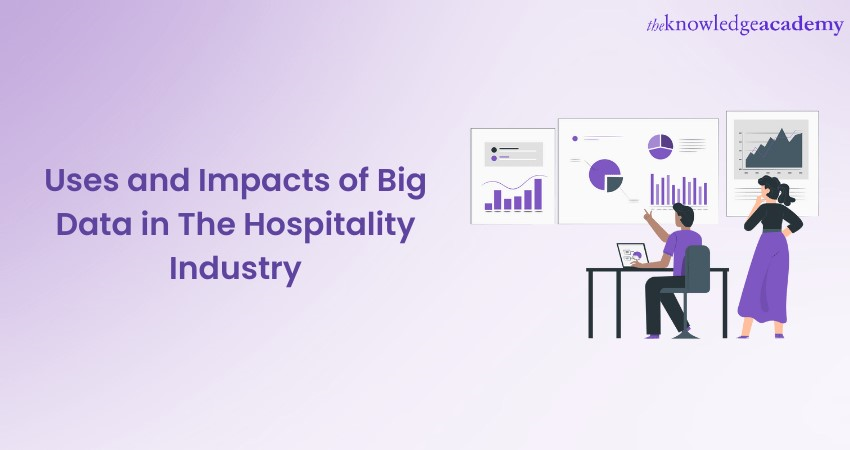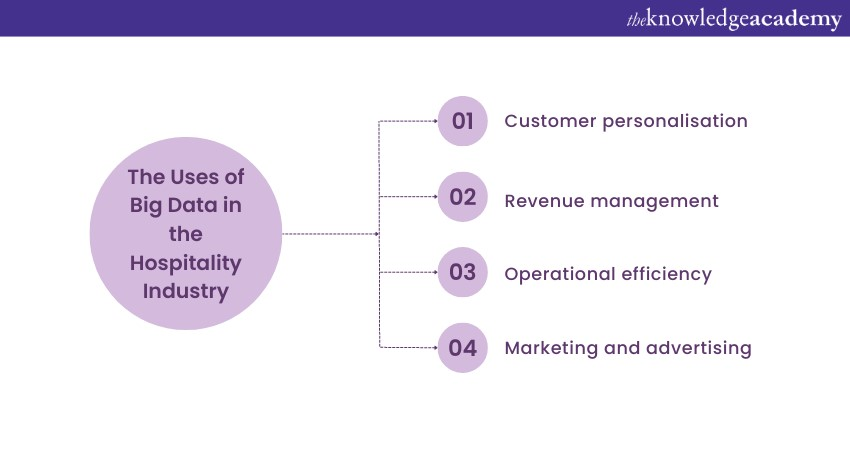We may not have the course you’re looking for. If you enquire or give us a call on +30 2111995372 and speak to our training experts, we may still be able to help with your training requirements.
Training Outcomes Within Your Budget!
We ensure quality, budget-alignment, and timely delivery by our expert instructors.

Big Data has become a crucial aspect that drives innovation within the Hospitality Industry. The introduction of Big Data in Hospitality Industry has given rise to profound shifts, redefining how hotels, restaurants, and other establishments operate. It is a technological evolution that promises to enhance customer experiences, streamline operations, and drive profitability.
In this blog on understanding Big Data in Hospitality Industry, we will embark on a journey to explore the profound uses and impacts of the same. From personalised guest experiences to data-driven revenue management, we'll dive deep into the diverse ways Big Data is reshaping the industry.
Table of contents
1) Understanding Big Data in Hospitality Industry
2) The uses of Big Data in the Hospitality Industry
a) Customer personalisation
b) Revenue management
c) Operational efficiency
d) Marketing and advertising
3) The impact of Big Data on the Hospitality Industry
4) Conclusion
Understanding Big Data in Hospitality Industry
In the Hospitality Industry, "Big Data" is significant and extends beyond mere volume. It encompasses the vast and intricate web of daily information, comprising structured data, such as booking records and transaction histories, and unstructured data, including guest reviews, social media interactions, and even sensor data from connected devices. This data poses both a challenge and an opportunity for businesses in this sector.
a) Volume: The sheer volume of data generated within hospitality is staggering. Every booking, guest check-in, room service order, and online review contributes to an ever-expanding pool of information. This data extends beyond individual transactions, encompassing seasonal variations, regional trends, and global travel patterns.
b) Velocity: The speed at which data is created and must be processed is crucial. In real time, hotels and restaurants receive reservations, monitor occupancy rates, and manage guest requests. Collecting and analysing data as it flows in is essential for immediate decision-making.
c) Variety: Hospitality data is remarkably diverse, spanning structured data in databases to unstructured data in text, images, and videos. This variety includes guest profiles, social media feedback, and data from IoT devices like room thermostats and keycards.
d) Value: The true potential of Big Data in the Hospitality Industry lies in its ability to unlock valuable insights. Businesses can extract meaningful information from the vast sea of data by using Data Analytics and Machine Learning algorithms. This information can drive strategic decisions, improve operational efficiency, and enhance the guest experience.
e) Veracity: Data accuracy and reliability are paramount. Only accurate or updated information can lead to accurate decisions and potential customer satisfaction. Ensuring data integrity through robust data management practices is crucial.
f) Visualisation: Converting raw data into meaningful visualisations, such as charts and graphs, is essential for stakeholders to grasp insights quickly. Visualisation tools empower decision-makers to effortlessly identify trends, patterns, and anomalies in the data.
g) Volatility: Hospitality data can be highly volatile due to seasonality, special events, and unforeseen circumstances like the COVID-19 pandemic. Adaptability and the ability to respond to rapidly changing data are vital for success.
Gain specific skills in Big Data, sign up for our Big Data and Analytics Training now!
The uses of Big Data in Hospitality Industry
The Hospitality sector can benefit greatly from Big Data, as it opens many opportunities for them to explore. Here are some of the critical uses that are reshaping the industry:

Customer personalisation
1) Personalised recommendations: Big Data allows hotels and restaurants to create tailored recommendations for guests. By analysing past booking preferences, dining choices, and online behaviour, establishments can suggest room upgrades, menu items, and local experiences that align with individual priorities.
2) Targeted marketing: Businesses can craft highly targeted marketing campaigns with Big Data. Personalised offers and promotions can be sent to specific customer groups, increasing conversion rates.
Revenue management
1) Dynamic pricing: Leveraging historical booking data, local events, and market demand, Big Data enables dynamic pricing. Hotels and restaurants can adjust room rates and menu prices in real-time to optimise revenue. For instance, costs can be increased during peak seasons or high-demand periods, while discounts can be offered during off-peak times to attract budget-conscious travellers.
2) Demand forecasting: Predictive analytics based on Big Data can forecast demand trends accurately. This allows businesses to allocate resources efficiently, ensuring they have the right staff, rooms, and supplies to meet customer needs without overcommitting resources.
Operational efficiency
1) Inventory management: Big Data aids in inventory tracking and management. For restaurants, this means reducing food waste by predicting demand accurately. It involves optimising the supply of toiletries, linens, and other amenities for hotels.
2) Energy efficiency: Businesses can monitor and control energy consumption in real-time by utilising data from IoT sensors. Adjusting heating, cooling, and lighting systems based on occupancy can result in substantial energy savings.
3) Staff optimisation: Data Analytics helps in optimising staff scheduling. This ensures the correct number of employees is on duty during peak hours, avoiding overstaffing during quieter times.
Marketing and advertising
1) Social media insights: Big Data provides insights into social media conversations and trends. This information helps businesses understand what guests say about them online, enabling them to respond to feedback and improve their online reputation.
2) Online advertising: Advertisers can use Big Data to target potential customers precisely. For example, hotels can display ads to users recently searching for accommodation in their area.
Understand the basics of Data Science, sign up for our Data Science Analytics now!
The impact of Big Data on the Hospitality Industry
Big Data has significantly impacted the Hospitality Industry, transforming all areas of operation. Here's a closer look at its profound influence:
1) Improved guest experience:
a) Personalisation: Big Data empowers hotels and restaurants to offer highly personalised experiences. Upon arrival, guests feel valued when greeted with their preferred room type, amenities, or dining options.
b) Efficient check-in/check-out: Streamlined check-in and check-out processes reduce guest wait times. Mobile apps and self-service kiosks that use data for verification and keyless entry are becoming increasingly popular.
c) Customised services: Guests can request personalised services, such as room service, spa treatments, or transportation, with the convenience of mobile apps or in-room tablets.
2) Enhanced decision-making:
a) Data-driven insights: Hospitality businesses can make data-driven decisions with confidence. Insights into guest behaviour, market trends, and competitor analysis inform strategic planning.
b) Real-time analytics: Real-time Data Analytics allow businesses to respond swiftly to changing circumstances. For example, hotels can adjust pricing and availability in real-time if a sudden event drives increased demand in a specific location.
c) Predictive maintenance: Data Analytics help predict equipment maintenance needs, reducing downtime and ensuring a seamless guest experience.
3) Cost reduction:
a) Energy efficiency: Optimised energy consumption, guided by Big Data, results in significant cost savings. This includes intelligent climate control, lighting, and water management.
b) Resource management: Efficient inventory and staff management, supported by data insights, minimises wastage and labour costs.
c) Marketing efficiency: Targeted marketing efforts reduce marketing spend while achieving higher conversion rates. This ensures a better return on investment for advertising campaigns.
4) Competitive advantage:
a) Customer loyalty: Efficient service and personalised experiences foster customer loyalty.
b) Market differentiation: Businesses can stand out by offering unique experiences based on Big Data.
c) Adaptability: The ability to adapt quickly to market changes, guest preferences, and unforeseen events provides a significant competitive edge.
d) Innovation: Big Data drives innovation across industries as businesses find new ways to leverage data for competitive advantage.

Conclusion
Big Data in Hospitality Industry has brought about a new era of personalised experiences, operational excellence, and competitive advantage. Its impact on guest satisfaction, cost-efficiency, and innovation is undeniable. As we continue to embrace a data-driven future, the Hospitality Industry is positioned for further transformation and success.
Learn how to use Apache Storm, sign up for our Apache Storm Training now!
Frequently Asked Questions
Upcoming Data, Analytics & AI Resources Batches & Dates
Date
 Hadoop Big Data Certification
Hadoop Big Data Certification
Thu 23rd Jan 2025
Thu 20th Mar 2025
Thu 22nd May 2025
Thu 17th Jul 2025
Thu 18th Sep 2025
Thu 20th Nov 2025







 Top Rated Course
Top Rated Course


 If you wish to make any changes to your course, please
If you wish to make any changes to your course, please


